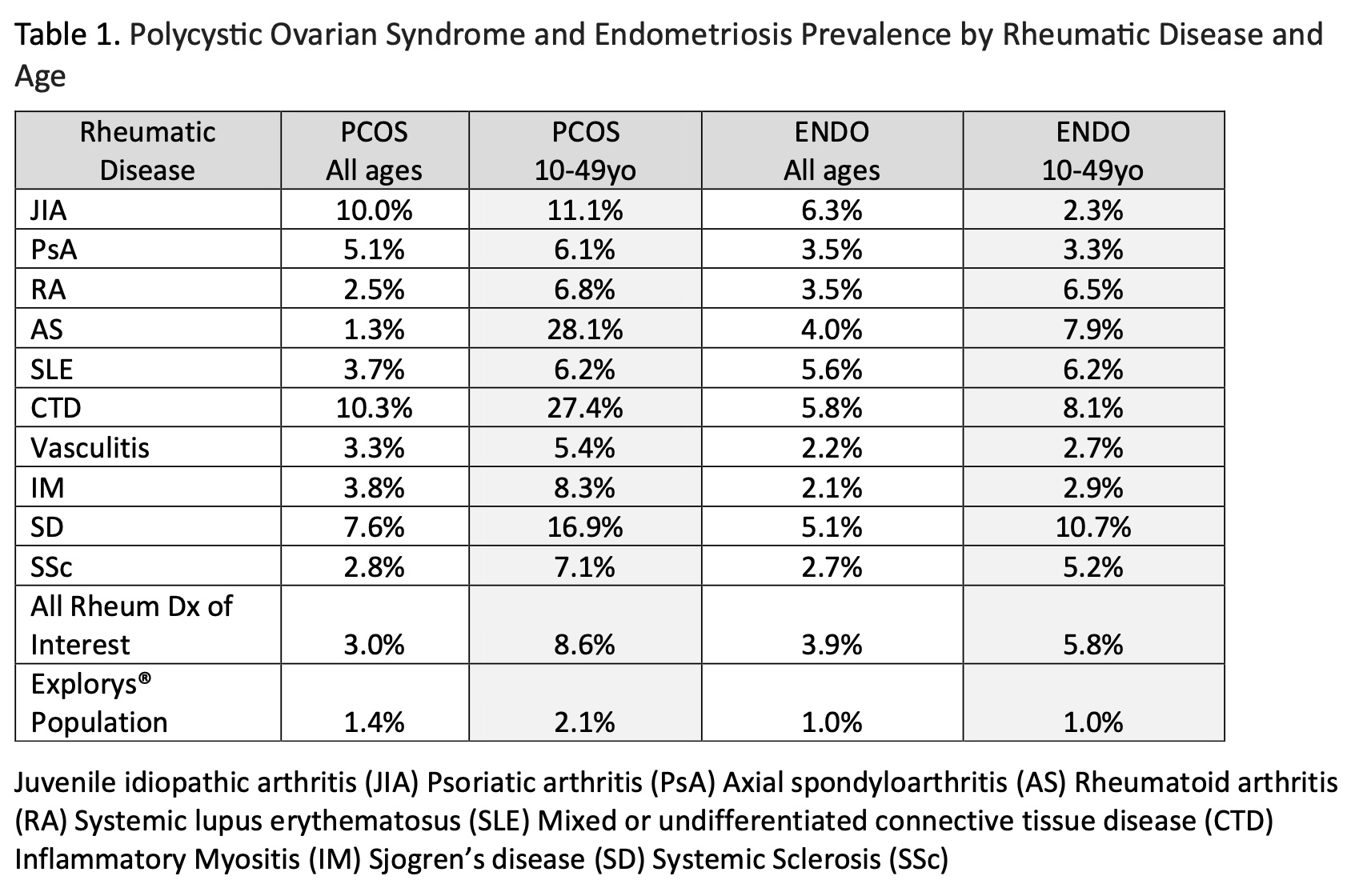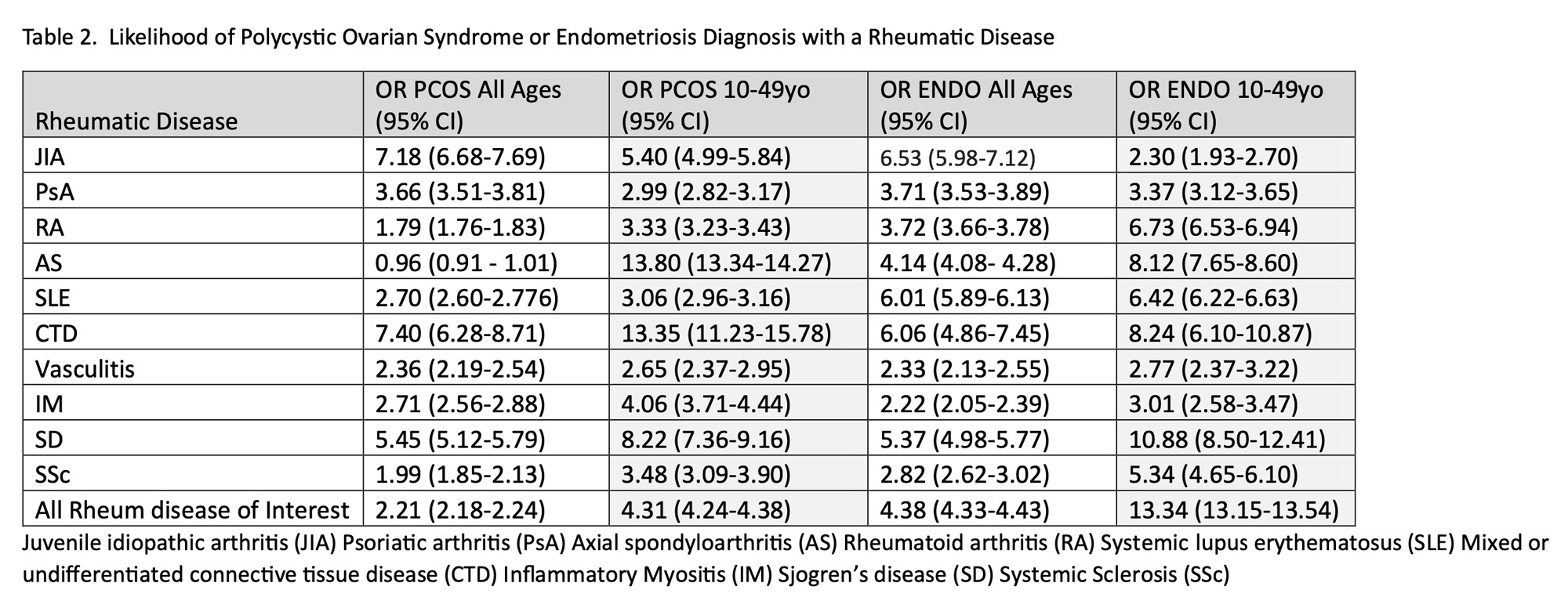Session Information
Date: Sunday, November 12, 2023
Title: (0460–0479) Reproductive Issues in Rheumatic Disorders Poster I
Session Type: Poster Session A
Session Time: 9:00AM-11:00AM
Background/Purpose: Endometriosis (ENDO) and Polycystic Ovarian Syndrome (PCOS) are underdiagnosed, often debilitating conditions with unknown etiologies that, like rheumatic diseases, affect reproductive-aged women. Recent studies suggest an association between ENDO across autoimmune diseases; PCOS has not been examined. The purpose of our study is to determine the prevalence and association of these conditions in patients with rheumatologic diseases in a large ambulatory population.
Methods: Utilizing the secure cloud-based platform, IBM® Explorys®, we conducted a retrospective cross-sectional study of females, ages 10-49, from the United States with PCOS or ENDO and rheumatic diseases using pooled deidentified data from multiple US health-care systems using Epic® electronic medical record platform, collected from 1999 to 2022. Rheumatic diseases examined: Juvenile idiopathic arthritis (JIA) Psoriatic arthritis (PsA) Axial spondyloarthritis (AS) Rheumatoid arthritis (RA) Systemic lupus erythematosus (SLE) Mixed or undifferentiated connective tissue disease (CTD) Inflammatory Myositis (IM) Sjogren’s disease (SD) Systemic Sclerosis (SSc).Females in the IBM® Explorys® platform with no rheumatic diseases served as the control group representing the general population. Chi-squared test and odds ratio (OR) were calculated.
Results: RA was present in 1% of the Explorys® population, in line with established epidemiologic data, serving as validation of the data set. The prevalence of PCOS and ENDO in the general population was under 2%, regardless of age.900,600 women had one of the queried rheumatic diseases, with 194,200 ages 10-49. In those with a rheumatic disease, 3% and 3.9% had PCOS and ENDO, in those 10-49 prevalence was 3.9% and 5.8%, respectively. Table 1 contains prevalence for each specific rheumatic disease. SD had the highest ENDO prevalence and SD, JIA, AS, and CTD the highest prevalence of PCOS. There is evidence that there is an association between each unique rheumatic disease or as a whole with ENDO (p< 0.0001) and PCOS (p< 0.0001).
If age 10-49 with a rheumatic disease, the odds of having PCOS was 4.3 (4.24-4.38) times higher than in the general population with the odds of having ENDO 13.34 (13.15-13.54).In this demographic, SD, AS and CTD had the highest likelihood of both ENDO and PCOS, which can be found in Table 2.Across all ages, JIA and CTD had the highest likelihood of PCOS and ENDO. SLE also had one of the highest likelihoods of having ENDO across all ages.
Conclusion: Increased prevalence and evidence of association exist between rheumatic diseases and both PCOS and ENDO compared to the general population when examined in a large electronic medical record platform. Additionally, there is an increased likelihood of having PCOS or ENDO in all rheumatic diseases analyzed. Future studies are needed to identify the mechanisms contributing to these findings of PCOS and ENDO in patients with rheumatic diseases as well as increased awareness of these underdiagnosed conditions amongst those who care for these patients to aid in their diagnosis and care.
To cite this abstract in AMA style:
Usmani S, Lavallee C, Antonelli M, Edens C. Prevalence of Endometriosis and Polycystic Ovarian Syndrome in Patients with Rheumatic Diseases in the United States [abstract]. Arthritis Rheumatol. 2023; 75 (suppl 9). https://acrabstracts.org/abstract/prevalence-of-endometriosis-and-polycystic-ovarian-syndrome-in-patients-with-rheumatic-diseases-in-the-united-states/. Accessed .« Back to ACR Convergence 2023
ACR Meeting Abstracts - https://acrabstracts.org/abstract/prevalence-of-endometriosis-and-polycystic-ovarian-syndrome-in-patients-with-rheumatic-diseases-in-the-united-states/


